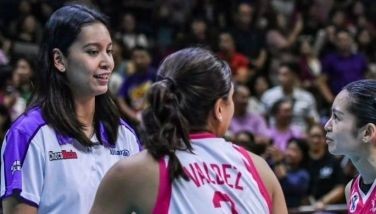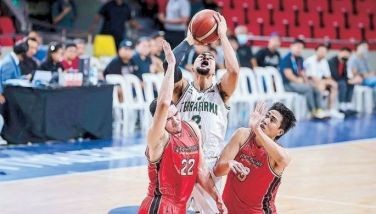PBA referees on their toes
MANILA, Philippines – PBA commissioner Chito Narvasa said yesterday the logic of the revolutionary four-referee rotation system is to protect the integrity of the game and so far, the approach is gaining ground in improving the level of officiating in the league.
Narvasa, on his first term as commissioner, introduced the rotation system this season and wields full authority in pulling out any of the three referees on the floor during a game and sending in a replacement. He said the system has meant an increase in the budget for referees as now, four arbiters are being paid to work a game instead of three but it’s a small price to pay for upgrading the efficiency of officiating.
“The system is educational,” said Narvasa. “I don’t know if it will catch on in other leagues. In the PBA, we do things differently. As commissioner, I don’t want our referees to control the end result of a game. In fact, none of the referees know who’ll be on the floor at the end of a game. Only the coaches and players should control the end result, nobody else. I think the referees are comfortable with the system, it’s keeping them on their toes. There hasn’t been a game where I didn’t make a sub.”
Narvasa said he subs at any time, even in the first period. “After I sub, the referee whom I replace sits beside me and I explain my observations,” he said. “They’re learning from this exercise. Eventually, I send the referee back in. But it’s never a sure thing which three will be on the floor at the end of the game.”
At the moment, the PBA maintains a pool of 16 referees. Before the first game of a doubleheader, representatives of the two opposing teams choose four referees from a pool of 12 by number so there is no duplication. For the second game, the pool is reduced to eight and the same process of selection is done. The referees are categorized into Classes A and B but over time, Narvasa said he will do away with the distinction. He said the objective is to standardize the level of competence for the entire corps.
“I don’t think we are disrupting the flow of the game by subbing referees,” said Narvasa. “I also don’t think it’s confusing the coaches and players. We can’t be personality-based. It’s not right to think coaches or players must adjust to a particular referee’s calls. What we’re striving for is consistency. No matter whom the referees are, their calls must be consistent so coaches and players adjust to the same calls. It’s the same thing with the referees. They can’t make calls on the basis of who’s playing. They can’t adjust calls depending on if it’s a big guy or a small guy. There’s no such thing as a let-go situation. If there’s a violation, call it.”
Narvasa said he subs referees for a reason and doesn’t do it indiscriminately or arbitrarily. “It depends on the situation,” he said. “Sometimes, I pull out a referee to remind him of something. Then, I’ll send him back. If there are no-calls or bad calls, I’ll sub. If a referee isn’t able to keep up, I’ll sub. But I don’t sub only if something is wrong. The key is focus. I’ve always told the referees that if they’re in the right position and they know the rules, 90 percent of the time they’ll make the correct call. But if they’re not in the right position and they’re not sure of the rules, then it’s a 50-50 thing. I keep reminding the referees not to guess, not to anticipate.”
Narvasa said the goal is to achieve perfection but referees are human like coaches and referees. “Of course, we want to be perfect but are coaches and referees perfect?” he continued. “They make mistakes, too. They commit turnovers, they miss free throws, they make wrong plays. But still, we want to raise our level of efficiency.”
Narvasa said he is in constant communication with coaches on how the referees are performing. “This is a collective effort and there is a need for constant communication,” he said. “Take for instance the Ginebra-Alaska game in Dubai. A foul was called in the dying seconds and (Greg) Slaughter made the free throws to win it for Ginebra. The issue was raised by Alaska. Remember, it doesn’t matter if we’re in the first or last minute of the game. If there’s a foul, the referee will call it. It’s too bad we were able to get only one camera angle on the foul. But Sherwin Pineda, the referee who made the call, was consistent throughout the game. We reviewed it on tape and my conclusion was it was a good call. (Noy) Baclao reached in and made contact.”
Narvasa said while he has the power to sub referees, he has no authority to change judgment calls. “Once a foul has been called or a call has been made, that’s it,” he said. “You can’t change calls so just play on. I can’t do anything about a referee’s judgment call. If it’s a technicality, then it’s a different story. If I have the power to change calls, then teams have no relief. Two things are essential in establishing a referee’s efficiency. First, he must be competent. That’s the technical side. Second, he must know how to manage the game, how to deal with coaches, interact with players. If there’s high emotion, they should know how to keep things under control.”
- Latest
- Trending
































